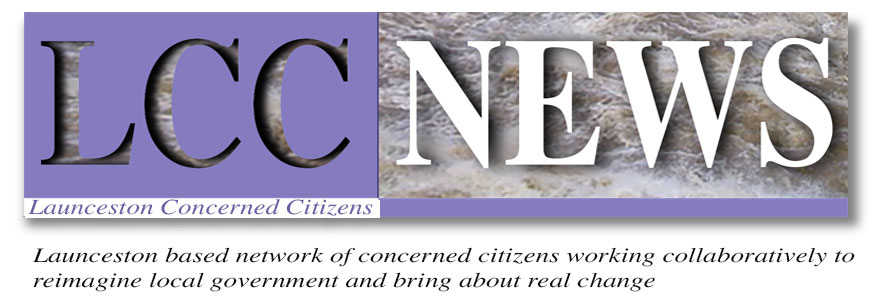This email has been sent to each elected
representative on City of Launceston's Council
FOR YOUR CONSIDERATION
Dear Councillor
Given the COVID19 crisis, and the ‘climate emergency’ that Council has declared, together these things are currently, and will continue to, impact upon the city of Launceston’s finances, future planning priorities going forward. Consequently, Council’s operational priorities need to be seriously reconsidered.
Unavoidably, these factors will, in fact arguably must, continue to be given proactive consideration for the foreseeable future. So, on the evidence, status quo thinking is inappropriate as planning for the future is reconsidered and realigned.
Against this backgrounding members of the Launceston Concerned Citizens Network have resolved to write to each Councillor individually to canvass your individual and independent position in regard to:
- Proactively engaging with citizens, ratepayers and residents, in regard to budgetary decision making. More specifically, doing so by initiating a ‘citizen’s assembly’ to provide a truly authoritative background for such decision making;
- Proactively engaging with a broad spectrum of ratepayers and residents in regard to cultural landscaping priorities and placemaking policy determinations. More specifically, doing so by initiating a ‘citizen’s assembly’ and/or ‘citizens referenda’ to provide a truly authoritative background for such significant decision making;
- Restructuring local governance in Tasmania to reflect 21st Century imperatives and opportunities that allow for more direct opportunities for ‘direct democracy’ and ‘participatory governance’ in order to bring decision making as close as possible to the people being impacted upon.
If you do not wish to respond to this communication, by say April 3rd ,it will be understood that on these issues you do not wish to articulate your position at this time.
Please respond to LAUNCESTONprojects
FOR FURTHER INFORMATION SEE
How Launceston Council plans to
spend its 2020/21 budget
PATRICK GEE, The Launceston News
A RATES increase, a focus on Launceston City Deal commitments and a $35.4 million spend on capital projects are all part of City of Launceston Council’s draft budget and plan for 2020/21.
Councillors will vote to release the documents for community feedback at Thursday’s ordinary meeting.
Mayor Albert van Zetten said council was proposing a 3.9 per cent increase in rates, which was just above the council cost index of 3.38 per cent.
He said council would focus on delivering City Deal commitments, including the River Health Action Plan, City Heart, My Place My Future, stormwater management and the traffic signal upgrade.
Capital projects listed in the budget include $7 million for an upgrade and refurbishment of the Albert Hall, $6 million for a new Launceston Waste Centre cell liner, $3.13 million for the urban road renewal program, $2.4 million for a road resealing program and $1.5 million for a UTAS Stadium upgrade and sports facility feasibility study.
“Our organisation is moving towards becoming more agile and we have the ability to mobilise resources to deal with emerging issues, which potentially could include the Council’s response to managing the coronavirus pandemic,” Ald van Zetten said.
Ald van Zetten said council had implemented measures to mitigate a number of rising costs to council.
“Launceston continues to be impacted by the reduction in the TasWater distribution – some $1.36 million for our Council alone and a reduction in interest revenue due to historically low interest rates – a loss of more than $1.2 million.
“That’s on top of a $1.5 million TasWater charge for our combined system, $500,000 in maintenance and depreciation costs for Riverbend Park and wearing the cost of $322,000 a year for the free FOGO service.
Garbage collection costs have also risen 11.3 per cent to $5.38 million.
Ald van Zetten said mitigation would be through a review of council assets and depreciation and a review of the governance arrangements for major regional assets like UTAS Stadium and QVMAG.
Council is expecting to save $400,000 in the first year after converting the Launceston Aquatic Centre’s gas system over to a heat pump/solar system.
“Overall, the Council continues to be in a strong financial position and has budgeted for a comprehensive surplus of $9.8 million in 2020/21, with an underlying operating budget deficit of $1.88 million.”
Burnie City Council will consider
whether rates should be waived
HELEN KEMPTON, The Launceston News March 23, 2020 9:00am
THE Burnie City Council is being asked to put all major developments – including its $18 million new art centre – on hold and instead provide rate relief to the city’s residents.
Councillor Ken Dorsey has put up a motion to be debated at the council’s next meeting that all capital works projects be put on hold and the $5 million the council money set aside to progress the proposed Burnie Museum and Art Galley be used for rate relief.
Cr Dorsey also wants the first hour of parking in the city’s multistorey carpark to be waived to help retail businesses weather the coronavirus storm.
“With the reduced workload, those with excessive annual leave and long service leave should be required to use this time to reduce the council’s entitlements while protecting them as individuals,” his motion says.
“Included in this package of relief would be to withhold any funds owing to external semi-government bodies.
“With the current restrictions placed on travel, visitation, gatherings and events it is imperative that we as a community work together to reduce the strain that this is putting on individuals and businesses.
“While I am a firm believer and proponent of the premise that we must persevere regardless of the circumstances, this has become a situation where jobs will be lost, business will close and our way of living altered for years to come.
“We have funds allocated to capital works that can be postponed and redirected towards providing rate relief for families and businesses adversely affected by current events.









